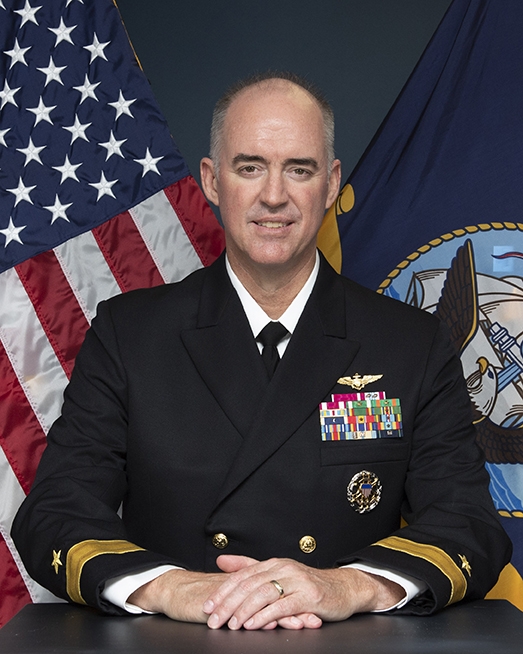Instilling a culture of self-improvement

Since entering the U.S. Navy reserves from active duty in 2001, Rear Adm. Scott Ruston has balanced dual careers. In addition to upholding his responsibilities as a Naval officer, a helicopter pilot and leader, he served as an academic researcher and the director of the Global Security Initiative’s Center on Narrative, Disinformation and Strategic Influence.
Now, he's being called to bridge those careers and apply his expertise in strategic communication and narrative analysis to a new Navy initiative called Get Real, Get Better. Ruston serves as the director of the program, which provides a framework for Navy teams, leaders and personnel to identify strengths and shortcomings and use that analysis to improve performance.
As of June, Ruston departed the Global Security Initiative to report to Adm. Lisa Franchetti, the vice chief of naval operations, where he will oversee the rollout of the Get Real, Get Better initiative to the Navy’s more than 340,000 active-duty sailors and 100,000 reservists.
Transforming Navy culture
Ruston characterizes Get Real, Get Better as an initiative in organizational transformation, which aims to instill a culture of critical analysis and critical thinking, as well as self-assessment and self-correction throughout the Navy.
“The Navy's full of super high-performing teams,” Ruston said. “Whether it’s on the flight deck of an aircraft carrier where sailors are constantly launching and recovering aircraft, hundreds of feet below the ocean where our most strategic assets of national defense try to remain stealth, or SEAL teams conducting operations to take out a wanted terrorist — our sailors must operate at a level of peak performance.”
Rear Adm. Scott Ruston. Photo courtesy U.S. Navy
However, an organization with such a high standard of performance and achievement can be a victim of its own success. Individuals may not feel empowered to ask for help or address shortcomings. Self-assessment and self-improvement are vital to the Navy’s future and operational success, which is what Ruston hopes Get Real, Get Better will ingrain in sailors fleetwide.
“We need to create the culture within the organization so that teams can recognize where they are and self-improve before we have an aircraft mishap, before we have a ship collision, before deferred maintenance — and ignored maintenance and standard slippage — turns into some kind of catastrophic event,” Ruston said.
The motivations for Get Real, Get Better goes beyond improving performance. Naval leadership recognizes that the service faces pressing issues. Sailors are dissatisfied with service, pay and housing. Though suicides in the Navy decreased last year, the overall rate has trended upwards since 2006. Recruitment is lagging — despite the Navy lowering testing standards and raising the age cutoff.
“There's a phrase that’s become part of our lexicon: ‘Embrace the red,’” Ruston said. “If green is good, orange is off track a bit and red is an indicator of subpar performance — rather than ignoring or hiding the red, we’re going to own it. We’re going to be honest about where performance is lacking and then communicate the plan to fix it and ask for help when necessary. That’s one of the interesting goals of this initiative: to introduce this culture of self-analysis and self-correction and clearer identification of challenges.”
Ruston brings unique experience and perspective
Though his 31 years in the Navy as a helicopter pilot, a helicopter instructor and various leadership roles will serve him well as the Get Real, Get Better director, it’s Ruston’s research experience that makes his new assignment a near-perfect fit.
As an expert on strategic communication, narrative analysis and the role stories play in the behavior of cultures and communities, he brings a wealth of experience to an initiative focused on shifting cultural values. For example, in 2019, Ruston studied whether Division I football players reported head impacts sustained during games or practice, and the cultural factors that influenced them. Reporting was quite rare, despite players being informed of the risk and signing a document stating their responsibility to notify coaches and trainers of any head impacts at the outset of the season.
While there are obvious explanations to low reporting, such as the competitiveness of athletes and a desire to stay in the game, Ruston argues that the idea of sports heroes overcoming injuries to win, a prevalent narrative in sports culture, greatly outweighs the communicated risks of head injury for the players.
“The power of your argument is not in the cost-benefit analysis or rational logic that you can muster. It's in the narrative logic that you bring to bear. It's how you can tell stories that tie the experience of the individual you're trying to influence to the stories about the world,” he said.
As the director of the ASU Global Security Initiative's Center on Narrative, Disinformation and Strategic Influence, Rear Adm. Scott Ruston's research expertise makes him well suited to lead the Get Real, Get Better initiaitve. Photo by Andy DeLisle
Ruston hopes to apply his understanding of how people view the world through narratives and how narratives can be constructed to achieve institutional change to Get Real, Get Better.
“How do we structure the delivery of this initiative in a way that comports with people's identity as sailors, aligns with the missions we're trying to achieve, and the values of the Navy?” Ruston asked. “It’s one of the things I'm looking forward to, and I think there's quite a bit of my research background that I can bring to bear to be positive and successful.”
As a Navy reservist since 2001, he views himself as both an insider and outsider to Navy culture. He believes this position, and his perspective as a researcher, will aid him in guiding and disseminating the goals of the initiative.
While researchers are trained to remove themselves from their object of study and engage in critical analysis, Ruston characterizes the Navy as a very action-oriented organization: It sets goals in order to advance forward and accomplish missions.
“In my opinion, what defines our organizational culture is not a high degree of pause, step back, take a look from a different angle and analyze,” Ruston said. “But that's exactly what we do in research and scholarship. So, bringing that perspective and helping imbue that into the culture is an advantage I bring to the job. That's also one of the advantages of the reserve force to the Navy, is that you end up with personnel that have skillsets that are not routinely developed within the Navy, so we can bring those injections of new ideas.”
At the beating heart of the Navy
While Ruston’s career at ASU has prepared him well for his new Naval assignment, he also thinks that his experience with Get Real, Get Better will benefit the university upon his return.
Not only will he be at “the beating heart of the Navy” as part of the vice chief of naval operations’ office, but he’ll have valuable insight into the specific research needs of the military.
“The Pentagon is ground zero for defense strategy, which informs everything the department — and the Navy — do, from planning to operations, but also to the acquisitions,” Ruston said. “Research is part of the acquisitions process and is informed and shaped by those strategic priorities."
Ruston will have exposure to the Navy side of acquisitions as the principles of Get Real, Get Better permeate throughout the fleet.
“That process is in need of self-reflection, simply because of the changes in the 21st century,” Ruston said. “We've moved from a very heavily industrially based economy and military to more of a knowledge economy.”
As he takes on his new assignment, Ruston is comforted with the knowledge that he’ll be returning to an employer that values and supports his service in the future. Prior to leaving ASU, Ruston submitted Global Security Initiative leadership for recognition at the 2023 Navy Employer Recognition Event.
Each year, the Navy Employer Recognition Event recognizes employers who provide outstanding support to Reserve sailors in their civilian career and hosts them for tours of Navy ships, aircraft and facilities, as well as a dinner reception with Naval Reserve leadership.
“Maintaining two careers and being asked at a minimum to give up one weekend a month and two full weeks a year to go to training is a challenge to balance, and a lot of Navy reservists do a whole lot more than that,” Ruston said.
Despite the challenges, Ruston notes that the Global Security Initative has been remarkably supportive of his service.
“It’s been an honor and a pleasure to work with Scott, and we could not be more grateful for his service to the nation and ASU,” said Nadya Bliss, executive director of the initative. “One of GSI’s core objectives is to positively affect national security and defense through the exceptional people working in GSI. So, while we will miss Scott tremendously, we look forward to seeing the impact he will have in this new role with the Navy.”

